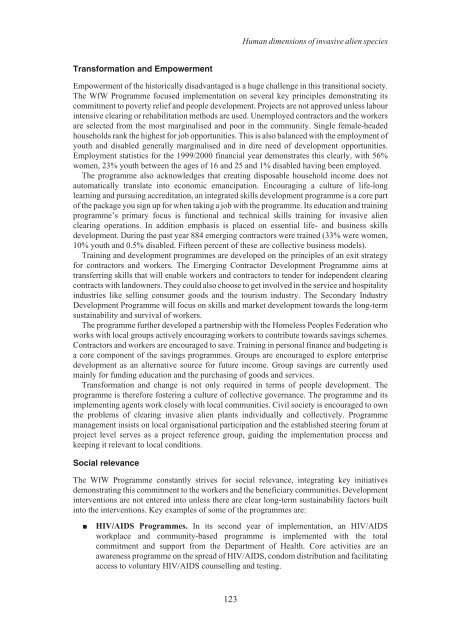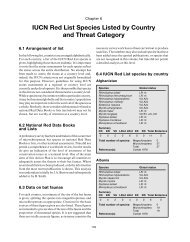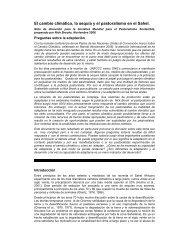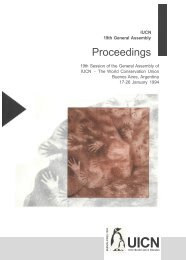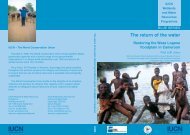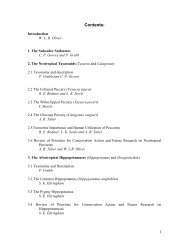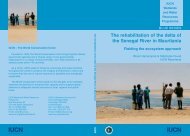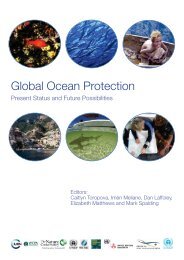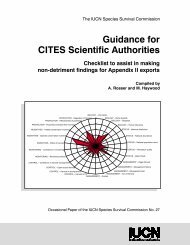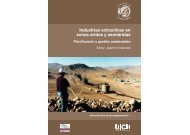Alien Species.vp - IUCN
Alien Species.vp - IUCN
Alien Species.vp - IUCN
Create successful ePaper yourself
Turn your PDF publications into a flip-book with our unique Google optimized e-Paper software.
Transformation and Empowerment<br />
Empowerment of the historically disadvantaged is a huge challenge in this transitional society.<br />
The WfW Programme focused implementation on several key principles demonstrating its<br />
commitment to poverty relief and people development. Projects are not approved unless labour<br />
intensive clearing or rehabilitation methods are used. Unemployed contractors and the workers<br />
are selected from the most marginalised and poor in the community. Single female-headed<br />
households rank the highest for job opportunities. This is also balanced with the employment of<br />
youth and disabled generally marginalised and in dire need of development opportunities.<br />
Employment statistics for the 1999/2000 financial year demonstrates this clearly, with 56%<br />
women, 23% youth between the ages of 16 and 25 and 1% disabled having been employed.<br />
The programme also acknowledges that creating disposable household income does not<br />
automatically translate into economic emancipation. Encouraging a culture of life-long<br />
learning and pursuing accreditation, an integrated skills development programme is a core part<br />
of the package you sign up for when taking a job with the programme. Its education and training<br />
programme’s primary focus is functional and technical skills training for invasive alien<br />
clearing operations. In addition emphasis is placed on essential life- and business skills<br />
development. During the past year 884 emerging contractors were trained (33% were women,<br />
10% youth and 0.5% disabled. Fifteen percent of these are collective business models).<br />
Training and development programmes are developed on the principles of an exit strategy<br />
for contractors and workers. The Emerging Contractor Development Programme aims at<br />
transferring skills that will enable workers and contractors to tender for independent clearing<br />
contracts with landowners. They could also choose to get involved in the service and hospitality<br />
industries like selling consumer goods and the tourism industry. The Secondary Industry<br />
Development Programme will focus on skills and market development towards the long-term<br />
sustainability and survival of workers.<br />
The programme further developed a partnership with the Homeless Peoples Federation who<br />
works with local groups actively encouraging workers to contribute towards savings schemes.<br />
Contractors and workers are encouraged to save. Training in personal finance and budgeting is<br />
a core component of the savings programmes. Groups are encouraged to explore enterprise<br />
development as an alternative source for future income. Group savings are currently used<br />
mainly for funding education and the purchasing of goods and services.<br />
Transformation and change is not only required in terms of people development. The<br />
programme is therefore fostering a culture of collective governance. The programme and its<br />
implementing agents work closely with local communities. Civil society is encouraged to own<br />
the problems of clearing invasive alien plants individually and collectively. Programme<br />
management insists on local organisational participation and the established steering forum at<br />
project level serves as a project reference group, guiding the implementation process and<br />
keeping it relevant to local conditions.<br />
Social relevance<br />
The WfW Programme constantly strives for social relevance, integrating key initiatives<br />
demonstrating this commitment to the workers and the beneficiary communities. Development<br />
interventions are not entered into unless there are clear long-term sustainability factors built<br />
into the interventions. Key examples of some of the programmes are:<br />
■ HIV/AIDS Programmes. In its second year of implementation, an HIV/AIDS<br />
workplace and community-based programme is implemented with the total<br />
commitment and support from the Department of Health. Core activities are an<br />
awareness programme on the spread of HIV/AIDS, condom distribution and facilitating<br />
access to voluntary HIV/AIDS counselling and testing.<br />
123<br />
Human dimensions of invasive alien species


